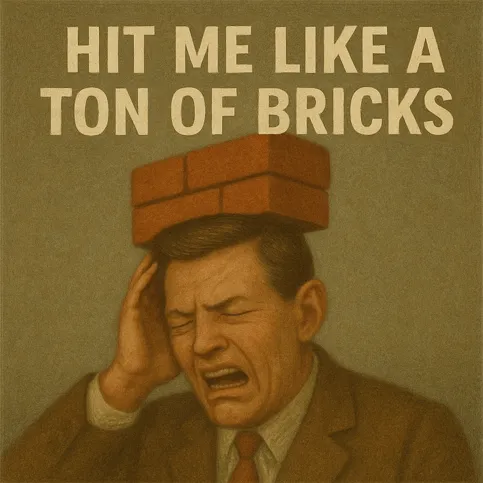What is the meaning of the phrase “hit me like a ton of bricks”
Something that has had a strong and overwhelming impact, often emotional or mental.
What is the origin of the phrase “hit me like a ton of bricks”?
The phrase “hit me like a ton of bricks” is a relatively recent one, believed to have originated in the early 19th century. Originally, the phrase “hit me like a thousand bricks” was used in Britain and America to refer to something having a strong and overwhelming impact. However, later the phrase evolved, with the words “a thousand” being replaced in the figure of speech with the words “ton of”.
It is not known who originally coined these terms, but they are likely to have derived from the idea of something heavy and forceful landing at force on someone, possibly originating from the image of lots of heavy bricks being dropped or falling.
Today, the phrase is culturally embedded and recognised instantly by most English speakers.
What type of figure of speech is the phrase “hit me like a ton of bricks”?
Although the phrase can perhaps be meant literally when depicting a scene in a cartoon, the phrase is by far more commonly used in a figurative sense as a metaphor. “Hit me like a ton of bricks” can also be classed as a simile, because it compares two things and uses the word “as”. (N.B. similes can also feature the word “like”.) Some people may argue that this is an overused phrase, also known as a cliche.
Interpretations of the phrase “hit me like a ton of bricks”
In contemporary usage, “hit me like a ton of bricks” often describes sudden realizations, such as epiphanies or moments of clarity. Or it can refer to emotional shocks, perhaps following unexpected news, revelations or events causing strong emotional reactions.
The phrase can also be used to refer to physical sensations such as the sudden onset of illness or fatigue. It can refer to a realisation that changes someone’s perception of something, and it can underscore the severity of various emotional experiences, such as heartbreak, grief, or harsh truths.
The expression typically carries a negative connotation, and is often associated with unpleasant surprises or distressing news. It’s also an evocative and concise way to communicate suddenness and severity or trauma.
Grammar and usage of the phrase “hit me like a ton of bricks” – with examples
Verb forms
hit (one) like a ton of bricks
to hit (one) like a ton of bricks
hitting (one) like a ton of bricks
hits (one) like a ton of bricks
It should be noted that the verb “hit” should be conjugated according to its tense. The word “one” can be replaced as appropriate with the words him/her/me/you/them.
You can use the phrase whenever something has had a strong and overwhelming impact on someone, whether physically or emotionally. For example, when someone has just been told of a dramatic turn of events, or if someone has just had a job loss or a relationship break-up.
Here are some examples of the phrase in use:
- When I heard my job was at stake it hit me like a ton of breaks.
- When he told her it was over, it hit her like a ton of bricks.
- When she said he had passed away, it hit me like a ton of bricks.
- When I read the conviction notice it hit me like a ton of bricks.
- When he got the divorce papers it hit him like a ton of bricks.
- The consequences of our actions hit us like a ton of bricks.
What are some other ways of saying “hit me like a ton of bricks”?
An early variant of the phrase “come down on someone like a thousand of bricks,” appeared in print as early as 1837. This variant of the phrase refers to coming down hard on someone, or being very severe and direct with them.
A similar expression is: “A light bulb went off/on”. For example, someone might say “When I saw the old photograph, a light bulb went off—I knew where I’d seen her before.” Whereas “hit me like a ton of bricks” is emotionally heavy, and often about tragedy or serious matters, the “light bulb” idiom is usually either positive or neutral.
Then there’s “It knocked the wind out of me”. For example, someone might write “When I heard the diagnosis, it knocked the wind out of me.” It’s very close in tone and function to “hit me like a ton of bricks,” although this phrase evokes breathlessness rather than crushing pressure.
You could also say “When the truth came out, it hit me hard.” This phrase serves a similar emotional function to “hit me likely a ton of bricks” but is less vivid.
Here are some more:
- I was floored
- It shook me to the core
- It was like a slap in the face
- It came out of left field / from nowhere
Cross-cultural equivalents of the phrase “hit me like a ton of bricks”
Here are some analogous expressions in other languages:
- French: Tomber comme un couperet (fall like a guillotine) conveys sudden and decisive impact.
- German: Wie ein Schlag ins Gesicht (like a slap in the face) denotes an unexpected and unpleasant surprise.
- Spanish: Caer como un jarro de agua fría (fall like a jug of cold water) expresses sudden disappointment or shock.
How do you say the opposite of “hit me like a ton of bricks”?
If you want to say the opposite of “hit me like a ton of bricks” this is basically like saying that something you left unfazed, which you might convey by something along the lines of barely even noticing, or querying whether something had even happened.
What are some notable uses of the phrase “hit me like a ton of bricks”?
The phrase “hit me like a ton of bricks” is often used in modern literature. For example in the children’s novel Bad Dad by David Walliams published in 2017, the phrase is used to evoke a poignant moment when a father receives devastating news in court: “That hit Gilbert like a ton of bricks. He looked over to his son with tears in his eyes, as the judge announced the sentence.” This is a textbook example of how the idiom is used to convey emotional shock in modern narrative fiction.
The phrase is also quite common in American TV shows, such as dramas and sitcoms, as well as in journalism, memoirs, and theatre.

